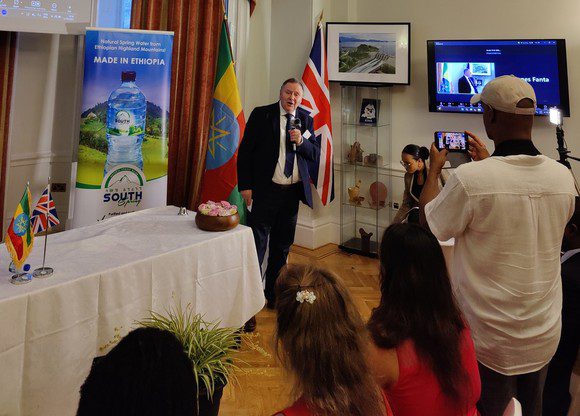Lord Malcolm Offord, Minister for Exports at the Department for Business and Trade, discusses the Free Trade Agreements that are helping UK businesses succeed internationally
Charles Darwin is often misquoted as having said that the key to a species’ survival is not to be the strongest, or the most intelligent, but the most adaptable to change. He may never have uttered those words, but the quotation persists because it rings true – and never more so than now, in our age of supercharged technological innovation. The world is smaller than it has ever been, and consequently the opportunities it presents are larger, for those able to adapt in order to take them. That’s why, once we became free to chart our own course, we have tilted the UK’s trade policy towards the Indo-Pacific. We can use our newfound nimbleness to tack towards the global region home to half the world’s people and 40% of its GDP, set to provide the majority of its growth and around half of its middle-class consumers in the decades to come.
This is an opportunity for UK businesses that we should not, and will not, let pass us by.
We have Free Trade Agreements (FTAs) in place with Australia and New Zealand for businesses to use right now; we’ve seen the first ever fully digitised shipment of goods arrive in Singapore under new world-leading legislation; and we are on the brink of being able to access benefits from joining a trade agreement with some of the world’s most dynamic economies.
Having left the EU, we now have the freedom to strike new FTAs as an independent trading nation. As Minister for Exports at the Department for Business and Trade (DBT), I am particularly excited by our new FTAs with countries such as Australia and New Zealand, and the possibilities they present to businesses across all parts of the UK. Our focus has been on unleashing the UK’s full potential internationally and unlocking barriers to create new opportunities for UK businesses. As it stands, the UK now has over 70 trade agreements in place, and we’re not stopping there.
The UK’s rebalancing away from EU has led many exporters to look at international opportunities for the first time. It has piqued their interest to understand more about our FTAs and why they matter. Put simply, FTAs are about the fundamental relationship between the businesses, consumers, people and governments of our countries. It is these relationships which determine how we do business, how we travel, and how we connect. And it is from this foundation that businesses from separate nations are encouraged to trade and invest more freely, set global standards and create opportunities to collaborate on shared challenges with global partners. That’s why the ambitious programme of FTAs we are making progress with is crucially important for the future direction of UK exports.
Many of you may know that an FTA typically brings with it a reduction or significant removal of tariffs on goods. However, did you know that trade agreements can make it easier to sell services overseas, offer more transparent opportunities to bid for overseas government procurement contracts, allow easier business travel and facilitate digital trading to make trade cheaper, easier and faster?
For Doctor Seaweed, whose seaweed supplements are harvested in the Scottish Outer Hebrides, having FTAs in place – and being talked about – has created a buzz of interest from the respective countries and given the impetus to act on opportunities overseas knowing the FTAs will ease that trade. We know businesses consider much more than FTAs when choosing where to export, but we hope they will be seen as an additional advantage when considering a new market and weighing up global commercial opportunities.
New FTAs
2023 was an exciting year for the progress of our new FTAs.
UK businesses have been able to access the provisions of the brand-new deals with Australia and New Zealand from 31 May last year.
In November, I was in Australia banging the drum for UK exports, where I saw firsthand the demand for British products from Australian buyers in rail, technology, healthcare, life-sciences and the food and drink sector.
Trade between the UK and Australia was worth almost £19 billion in the last financial year, with UK exports to Australia accounting for over two thirds of this. This figure was an increase of nearly 20% from the previous year and it was great to see long-standing economic ties with some of our oldest allies being revitalised.
It’s important to highlight the relevance of the trade deals for service companies too. The UK is the second largest exporter of services globally (Gov.uk), and UK businesses are well placed to meet the vibrant and growing demand in the Australian market. The UK-Australia FTA locks in access for UK businesses and guarantees an equal footing for British companies competing with their Australian counterparts. Our UK businesses are not required to have a local presence in Australia to provide a service, and British professionals delivering services in Australia have greater certainty and access to the market. For example, UK-based architecture firm Grimshaw – which has three studios in the Asia-Pacific region – now enjoys simplified and liberated arrangements for transfers between their studios.
Regulators are also being supported to agree mutual recognition of professional services to remove the burden of requalification requirements. One such mutual recognition agreement (MRA) has been signed making it easier for architects to register across the markets. UK architecture firms can now be confident that credentials will be recognised in Australia and New Zealand because of the agreement.
British businesses are already seeing benefits. Risk Decisions, an Oxford-based specialist risk management consultancy and software-as-a-service company, which does a significant amount of business internationally, says the new Australia FTA is “excellent” as it makes it easier for its employees to work in Australia. This has helped the firm attract staff who are interested in getting experience globally – with the prospect of spending time down under proving a particular draw.
It’s not only big businesses who are supported by the FTAs – lots of SMEs are benefitting too. These include Fifth Wheel, a Welsh caravan manufacturer, whose luxury touring caravans are popular exports to New Zealand. The company is now more competitive in the market with the removal of 5% tariffs under the FTA – saving one recent customer in New Zealand a whopping NZ$7,500 on a single caravan. This family business has built up New Zealand as a key export market based solely on positive word-of-mouth marketing over the last six years and now with the agreement in place can hope for even more growth. And what better way to explore New Zealand than in a luxury Welsh built tourer!
UK Roadshow
We are continuing to actively support and grow trade with Australia and New Zealand. In March, we will be hosting our colleagues from DBT Australia and New Zealand and HM Trade Commissioner for Asia Pacific here in the UK. Whilst sadly not in a Fifth Wheel caravan, we’ll be touring the UK to promote our new FTAs and encourage exporters to get involved with the opportunities in both countries. From 6-14 March we’ll be visiting Birmingham, Belfast, London, Cardiff, Manchester, Dundee, and we’d love to see as many businesses there as possible.
Last year, we also saw UK businesses continuing to build the long-standing trade and investment relationship with Japan. The UK–Japan Comprehensive Economic Partnership Agreement (CEPA) has provided opportunities for iconic British brands in food and drink, manufacturing, fashion and more to build their trade with a market where Britishness itself can be a unique selling point. Agreeing a deal with the world’s third largest economy and customers who greatly value quality, style, and a sense of tradition, with an appreciation for foreign products has been significant for the UK.
Businesses such as luxury men’s swimwear brand Hemingsworth, who made the outfits for the Kens in the recent Barbie film, are taking advantage of opportunities in Japan. The company’s Creative Director, Henry Butler, joined the Secretary of State on a trade mission last autumn, and says CEPA has been a game-changer for Hemingsworth Clothing’s export business. The agreement has eliminated or significantly reduced tariffs and trade barriers, making it easier and more cost-effective for it to sell its high-quality British fashion products. As a result, the company has seen a significant increase in exports to Japan.
The Agreement with Japan has also helped pave the way for the UK joining the Comprehensive and Progressive Agreement for Transpacific Partnership (CPTPP) which we signed our accession to in 2023. We were delighted to see Japan agreeing the UK’s entry to the CPTPP in late 2023.
CPTPP
In July 2023, we formally signed the treaty confirming the UK’s accession to the CPTPP. CPTPP is a modern and ambitious trade group spanning Asia and the Pacific, made up of 11 of the world’s most dynamic economies – Canada, Mexico, Peru, Chile, New Zealand, Australia, Brunei, Singapore, Malaysia, Vietnam, and Japan. With the UK as a member, it will account for 15 per cent of global GDP (a combined £12 trillion).
At the moment, 50 per cent of the UK’s exports are shipped outside of Europe. We therefore have a real opportunity to grow this half of our trade. The Indo-Pacific region is brimming with opportunity for UK exporters, with ASEAN (the Association of Southeast Asian Nations) expected to become equivalent to the world’s third largest economy by 2027, worth a huge £4 trillion in GDP. The CPTPP agreement is a gateway to this region, building on the bilateral agreements we already have with nine of the members, and providing a brand-new trading framework for our exports to Brunei, and Malaysia – a rapidly growing market with whom the UK already has a close trading relationship.
The UK already sells more services (worth £32.2 billion) than we do goods to CPTPP members, so it’s no accident that we have joined a modern trade agreement with ambitious services provisions that are ideally suited to the UK’s strengths. UK geocoding app what3words, for example, already has its tech being used for deliveries in Vietnam, and car navigation in Japan. It sees the UK’s membership of CPTPP helping to increase uptake across the automotive, logistics, e-commerce, and emergency services sectors in member countries. We’ve also heard from British premium chocolate producer and cacao grower Chocolat Madagascar that it expects CPTPP will enable it to grow in new markets, such as Australia and Singapore.
The agreement could also lead to cheaper import prices for raw materials with tariffs eliminated on a wide range of products, including machinery and chemicals. Greater access to global supply chains will be an important source of competitive advantage for businesses.
At the end of 2023, I visited Chile, one of 11 CPTPP current members, to explore the many opportunities of the UK joining the agreement. I led a trade mission of 12 British hydrogen and renewable energy companies to match them with business opportunities in the country. With Chile’s ambition to boost its renewable energy infrastructure, and the UK’s expertise and capabilities in this field, there is a clear opportunity for both our countries to benefit and prosper.
Manchester based Cocogreen, has already gained a firm foothold in the Latin American agriculture sector. It provides its world-leading coir substrate medium – a type of soil made using coconut husks to me and you – to berry growers in Mexico, Chile and Peru, all members of the CPTPP. These are among some of the firm’s quickest-growing export markets, and it anticipates further expanding across the region.
GREAT Business support
The FTAs we sign aren’t ends in themselves. They are vehicles through which to reduce barriers and costs, provide more certainty to businesses, and make it simpler and cheaper for you to trade. As our Business and Trade Secretary said, trade deals are like the motorway. It’s great that they’ve been built, but if cars aren’t using them, you might as well not have built them. And that is why I want to tell you all about them and how they can help you boost exports – to get as many of you as possible using these new fast lanes to business growth.
At the Department for Business and Trade (DBT), our priority is economic growth. That’s why we support businesses like yours to invest, grow, and export, creating jobs and opportunities across the country, and why we are seeking modern and ambitious free trade deals as ways to achieve this. It’s also why we set up the Free Trade Agreement Utilisation (FTAU) unit. This is a pioneering team in our department whose job it is to make sure businesses are aware of the UK’s new Free Trade Agreements and help them to take full advantage of the opportunities they present.
The FTAU team has already published more than 40 pieces of easily accessible guidance for businesses on the provisions of the Australia and New Zealand FTAs and they’re working on doing the same for CPTPP markets to help take the complexities out of FTAs to free up your time to do the important task of running your business.
DBT’s offer for business on FTAs is integrated into our existing export support ecosystem, which empowers SMEs with the knowledge and tools to unleash the full potential of FTAs. The UK Export Academy has created FTA-specific modules, which launched in October 2022, whilst for SMEs that are export ready, DBT’s International Markets team are based around the world, providing 1:1 guidance and local insights to help SMEs succeed overseas. Head to our website great.gov.uk where you’ll find lots more guidance and can access our support.
So, the opportunities are there for the taking to maximise your export potential. Are you ready to explore new markets? Do you want to make your business great?
Read more news and exclusive features in our latest issue here.
Never miss a story… Follow us on:
International Trade Magazine
@itm_magazine
@intrademagazine
Media Contact
Joseph Clarke
Editor, International Trade Magazine
Tel: +44 (0) 1622 823 920
Email: editor@intrademagazine.com








